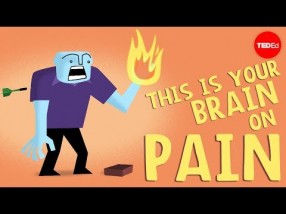3/30 VidTalk #1
Should You Trust Your First Impression?
Today marks our first ever episode of VidTalk, so we're looking at a video that talks about forming first impressions! Let's talk about that Vid!
下載節目影片教學
影片簡介
遇到陌生人的時候,我們很容易根據那個人當時的行為舉止產生第一印象,但是第一印象可信嗎?我們是不是可以根據第一印象預測別人的個性行為?對某個人的印象在未來有沒有可能改變?1
make fun of0:13
影片例句:He's loud, he spills his drink on you, and he makes fun of your team.
例句翻譯:他很吵,飲料灑到你身上,還嘲笑你的球隊。
make fun of 就是嘲笑、捉弄的意思,是一個片語動詞。另外一個很常用的片語是 have fun doing something,就是很享受做某件事的意思。
E.g., He was made fun of in school, but later in life he became a successful businessman.
他小時候在學校常被捉弄,但他後來成為了一個成功的商人。
補充:fun 跟 funny 是有差別的噢!fun 是有趣的,但是 funny 有時候當作「有趣」的意思,有時候當作「奇怪」的意思。原則上來說,如果要說「有趣」,直接使用 fun 會比較安全:he’s a fun guy 或是 we had a fun time 都可以。反觀 funny 比如說 something smells funny 或是 something looks funny 就是聞起來、看起來怪怪的。因此在使用這兩個字的時候要小心噢。
2
write someone off0:30
影片例句:Do you change your mind about him based on this second encounter? Or do you go with your first impression and write him off?
例句翻譯:你會根據這第二次相遇改變你對他的想法嗎?還是你依舊相信你的第一印象,不打算改變想法?
write someone off 表示不考慮、拒絕的意思。其實 write-off 是在會計學中「報廢」的意思 。brush someone off 也可以表達一樣的意思。
E.g., When you are in a relationship, it's easy to write off bad memories with good ones.
人在談戀愛的時候很容易忘記壞的回憶,只專注於好的回憶。
3
bias1:34
影片例句:Research suggests that this bias occurs because immoral behaviors are more diagnostic, or revealing, of a person's true character.
例句翻譯:研究指出,會產生這種偏見,是因為不道德的行為比較能判斷出或是顯露出一個人真正的個性。
bias 就是偏見,同義字是 prejudice。如果要表達對某人或某事有偏見,你可以說 have a bias against 或是 have a bias toward。這個字也很常跟其他名詞形成復合名詞,比如說 media bias, political bias, educational bias 等。
E.g., The bias toward the opposing political party is more intense than ever.
對於反對黨的偏見比起過往來的高漲。
4
not necessarily1:48
影片例句:Well, not necessarily. Certain types of learning don't seem to lead to this sort of negativity bias.
例句翻譯:這個嘛,也不一定是這樣。特定幾種的學習似乎並不會導致這種負面偏見。
not necessarily 是個迂迴的回答,並不是真的是,也不是真的不是。但是比較偏向「不是」的意思。同樣的意思你可以用 not technically 或是 not exactly。
E.g., He is not exactly the kind of guy I would want to go out with.
他不太是我的菜。
5
obnoxious-football-fan-turned-good-Samaritan3:23
影片例句:In the situation with the obnoxious-football-fan-turned-good-Samaritan,
例句翻譯:在那個討厭的足球迷變成了好心人的情況
這一整串的字是用來形容前面的 situation,中間用 - 連字號連接,變成一個很長的複合形容詞,這是現在英文中常出現的用法,所以這句的意思就是「當討厭的足球迷變成好心人的情況」。Samaritan 這個字原意是「撒馬利亞人」,而 the Good Samaritan 則是出自聖經故事,描述一位猶太人被搶劫受了傷倒在路邊,但是路過的高貴猶太人卻沒有伸出援手,反而是一位身分低微的撒馬利亞人幫助了他,後來 Samaritan 這個字就延伸來形容人「樂善好施、見義勇為」,也就是好心人的意思。
互動挑戰
用節目教的五個英文單字/片語裡選一個造出你自己的句子吧!禮拜三晚上12點前留下訊息,就有機會在下個禮拜的節目播出! (小提示:點擊頭像可以看別人的回應喔)
影片票選
一起投票決定下一集VidTalk的影片主題!(禮拜三晚上12點截止投票,千萬別錯過!)
主持人介紹
節目列表
錯過了VidTalk沒關係,快來收聽之前的節目廣播吧!

 登入或註冊
登入或註冊 





